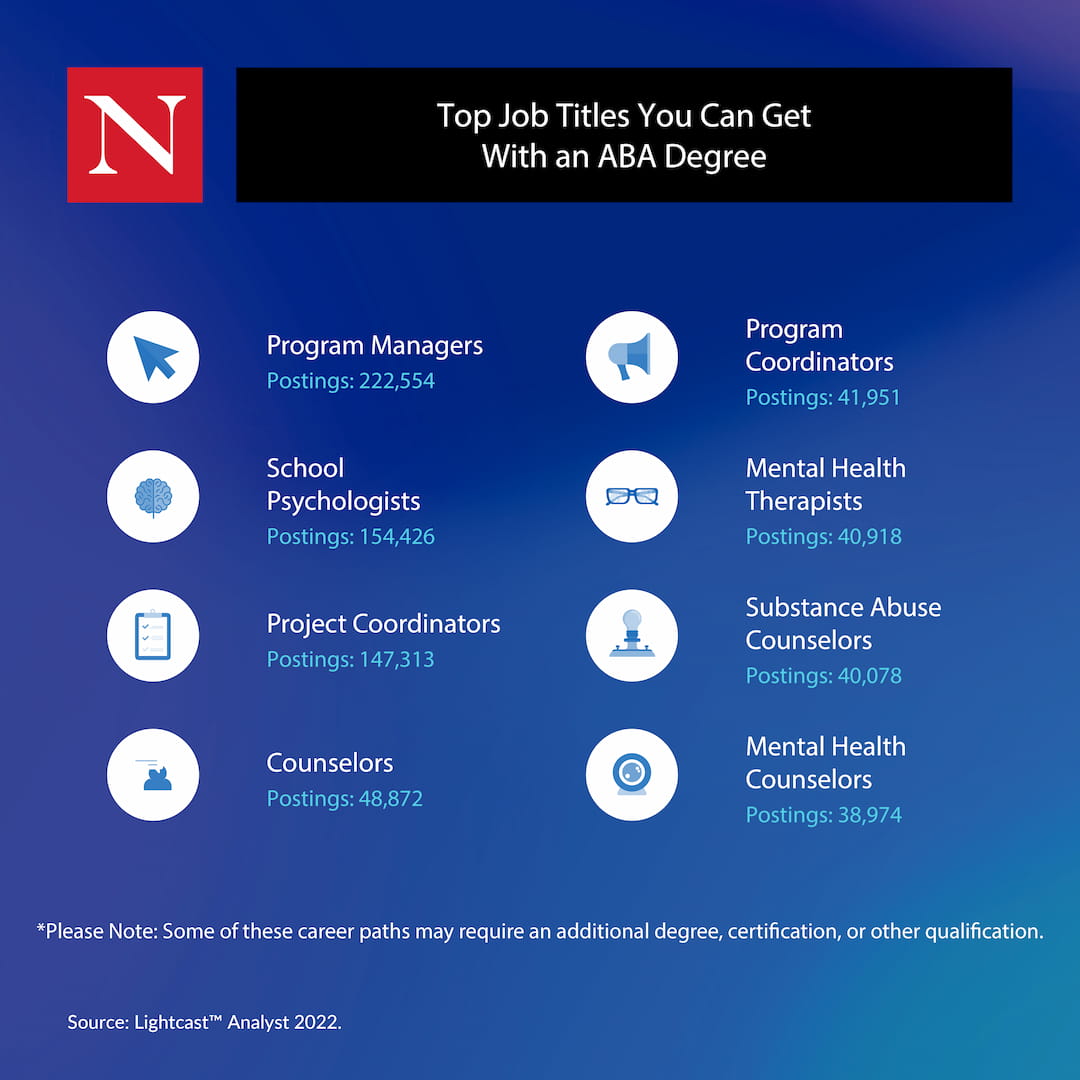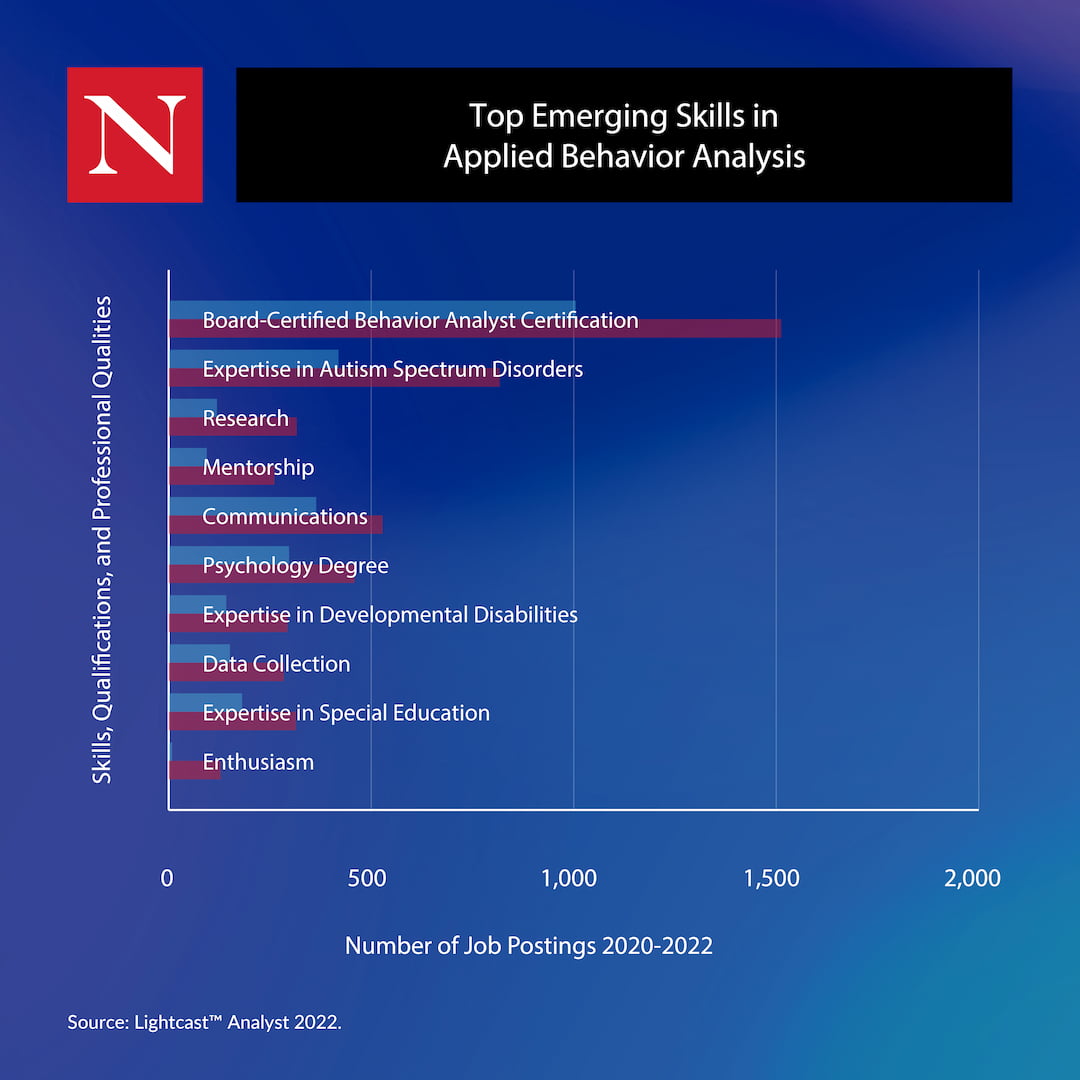There has been a growing skepticism around the value of college and advanced degrees in the past decade. According to an article by Bloomberg, only 56 percent of adults under the age of 30 who went to college said the benefits of their education exceeded the costs. This has led to more questions concerning the value of education.
A degree in applied behavior analysis (ABA), however, is an essential component of becoming a certified ABA professional. This degree opens the door to several career opportunities, including leadership positions. For example, many professionals with a psychology background often pursue an ABA degree to improve their understanding of human behavior and increase their knowledge of behavior disorders, including how to manage them.
If you’re concerned about the value of this degree, here’s an overview of the different careers you can obtain and how an ABA degree can prepare you for these exciting opportunities.
What Is Applied Behavior Analysis?
Applied behavior analysis is an evidence-based approach to understanding and improving human behavior. ABA applies these principles to address behaviors that are considered socially significant or important and strives to enrich the lives of the clients they serve.
Despite the wide range of populations that receive ABA services, “the vast majority of people who are behavior analysts work with individuals with developmental disabilities,” says Andrew Bonner, director of the Master of Science in Applied Behavior Analysis program at Northeastern University’s Charlotte campus.
Interested in an Applied Behavior Analysis Career?
Learn how an ABA degree can give you the skills you need to make a difference in the lives of others.
8 Jobs You Can Get With an Applied Behavior Analysis Degree
There are a number of careers that ABA degree holders are qualified for, but perhaps the most common career path is becoming a board-certified behavior analyst (BCBA). This requires a certification bestowed by the Behavior Analysis Certification Board (BACB). Despite the changing requirements for this certification, a degree in applied behavior analysis sets the foundation for becoming a BCBA.
Earning a degree in applied behavior analysis isn’t solely beneficial to behavior analysts though. Professionals such as teachers, counselors, or business leaders can choose to enhance their skills and knowledge of behavioral principles by pursuing an ABA degree. This can help individuals meet their career goals and expand their professional reach to a variety of settings.
No matter your professional aspirations, an ABA degree can transfer to a number of careers, including:

1. Program Managers
Program managers are in charge of successfully leading a program or initiative. As a leader, they manage team members, operations, and the overall impact of an initiative. Since this position requires constant interaction with fellow employees, program stakeholders, and the communities that these initiatives serve, program managers can benefit from an in-depth understanding of human behavior.
Managers should always consider possible behavior influences during the building and implementation phases of a program to ensure it runs smoothly. Earning an ABA degree can offer program managers this much needed insight to help them make more informed business decisions.
2. School Psychologists
School psychologists work together with teachers, administrators, and parents to help students who struggle personally or academically. They are licensed professionals, focused on assisting students dealing with trauma or other mental health issues while also addressing any negative effects these challenges impose on the student’s academic performance.
School psychologists typically work with children, much like a behavior analyst, and address negative behavior patterns as a result of their personal hardships. An ABA degree brings both knowledge and practice of the principles of behavior, making it easier for school psychologists to evaluate students’ behavior and create an effective plan of action.
3. Project Coordinators
Many organizations juggle several projects that require some form of project management. As a result, businesses often hire project coordinators to manage project timelines, materials, implementation, and communication among stakeholders across departments.
Having an ABA degree gives project coordinators the tools needed to better understand clients’, team members’, and stakeholders’ behavior-related issues and how to approach them. This empowers project coordinators to more effectively navigate the various dynamics that come out of high-pressure business environments.
4. Counselors
Counselors work with a broad range of individuals dealing with a plethora of mental health issues. They are often the first resource available to those who need emotional support. Counselors guide individuals, groups, families, and couples through trying emotional times. This is achieved through therapy sessions, close examination of influencing factors, and holistic approaches.
Counselors typically obtain a master’s degree and state licensure to practice. As a result, the teams they work in are often licensed professionals as well. Depending on the setting, counselors may even work with board-certified behavior analysts. In these cases, an ABA degree is a useful tool counselors can have to sharpen their knowledge of human behavior, resulting in more cohesive treatment plans for patients.
5. Program Coordinators
Similar to project coordinators, this job is responsible for managing business initiatives. Program coordinators take on various organization and administrative responsibilities, including preparing event and activity calendars, researching and collecting relevant information for program materials, and handling internal and external communications.
Program coordinators are often hired in industries, such as public health and healthcare, that often work with vulnerable populations. Therefore, it’s important that they understand the communities they serve. The expertise that an ABA degree offers makes it possible for program coordinators to better understand the behavior of their clients and build effective programs that positively impact them.
6. Mental Health Therapists
Mental health therapists work in clinical settings that provide a variety of therapy interventions to help patients struggling with various mental health challenges. They work in one-on-one, group, and even family sessions to address the root cause of a patient’s mental distress. Mental health therapists need a license to practice and can work in schools, community organizations, or even build their own practice.
Observing a patient’s behavior is a large part of assessing and treating people with mental health disorders. Earning an ABA degree can enhance a mental health therapist’s approach to clients’ mental health problems. Adding evidence-based analysis to their toolkit can make a patient’s assessment, and ultimately intervention plan, more individualized and more likely to succeed.
7. Substance Abuse Counselors
Substance abuse counselors work in programs available to individuals addicted to drugs and alcohol. They are trained specifically in the mental and physical health factors that are far more common in cases of addiction. Oftentimes these professionals must be certified in this field and have background experience in psychology or other related fields.
An ABA degree can help counselors analyze the behavior of substance abusers by evaluating their environment and incorporating behavior analytic methods into their treatment plan. People who struggle with addiction are often seen as impulsive, exhibiting sporadic behavior, but applied behavior analysis can reveal problematic influences impinging upon substance abusers and employ effective techniques to target these influences.
8. Mental Health Counselors
Mental health counselors are similar to therapists, but often spend their time helping patients look toward the future, rather than dive into the past. As a result, mental health counselors tend to work with patients for shorter periods, ensuring they can thrive beyond their counseling sessions.
Because mental health counselors want to improve patients’ quality of life, building positive behavior changes is important. An ABA degree helps individuals in this profession feel confident in the intervention they’re providing, knowing that applied behavior analysis techniques will lead to sustainable changes.
What To Expect From a Degree in Applied Behavior Analysis
An ABA degree provides the skills needed to be a qualified, effective, and successful behavior analyst. Exceptional ABA degree programs, like Bouvé College of Health Sciences’s Master of Science in Applied Behavior Analysis, offer students a verified course sequence, ensuring the path is focused on industry-applicable curriculum and supervised experience in the field.
While gaining industry experience can be difficult to schedule (e.g., 1,500 required hours), having access to people within the program that will advise and assist you in the field is important. As a result, mentorship and supervision are important aspects of an effective ABA program. Students need guidance that prepares them for the workforce and helps develop in-demand skills they need to be successful.
According to government data here are the top emerging skills, qualifications, and professional qualities that appear in an increasing number of ABA job postings:
- Research
- Communications
- Data collection
- Board-certified behavior analyst certification
- Psychology degree
- Expertise in developmental disabilities, autism spectrum disorder, and special education
- Mentorship
- Enthusiasm

ABA degree programs are meant to develop and build on these skills to ensure students’ long-term success. Degree programs should align with students’ needs, and offer flexibility that fits a student’s lifestyle and values. Such programs are more likely to attract students who will remain engaged in the coursework. Some ABA degree programs even offer prep courses to help students get ready for their board certification exam. Having the support and guidance to feel confident about passing the exam and prepared for work in the field is invaluable.
Get Started On a Path Toward a Career In Applied Behavior Analysis
As students evaluate ABA graduate programs it’s important to decide the type of behavior analysts they want to be. A degree program that nurtures students’ growth and development in the field is essential to anyone who’s apprehensive about the difficulty of obtaining these credentials.
Bouvé College of Health Sciences’s Master of Science Applied Behavior Analysis program fully prepares students for any career that leverages behavior analytic skills. By offering structured coursework and exam preparation, students will feel supported in their journey to becoming a behavior analyst, which can make all the difference.
Want to learn more about what you can do with an ABA degree? Check out Northeastern’s Master of Science in Applied Behavior Analysis program page.







Related Articles
4 Pressing Global Health Problems We Face Today
Global Health Careers: How Can I Make a Difference?
Compliance Specialists: Who They Are and What They Earn